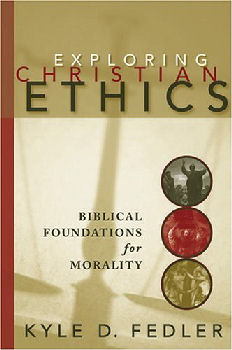
|
Posted March 29, 2006
Book: Exploring Christian Ethics: Biblical Foundations for Morality Author: Kyle D. Fedler Westminister John Knox, Louisville, KY, 2006, pp.233 An Excerpt from the Book:
An Excerpt from the Book: What is Virtue? A virtue is a type of habit. “Habit” is a technical term that has been used for over two thousand years to describe an inclination or disposition to act, think, or feel in a certain way. Habits are tendencies or patterns of behavior and thought. Virtue is a type of habit — but a habit to do or feel or think what? It helps to understand the origin of the word. “Virtue” is the English translation of the Greek arete, which means “excellence.” Originally the term was not restricted to human skills. The arete of a knife is its sharpness, and the arete of the blanket is its warmth. Everything has an end (telos) or goal or purpose for which it is designed. The knife is designed to cut: thus, its arete is its sharpness. The same is true for human beings according to most virtue ethicists, such as Aristotle: “Just as we can see that eye and hand and foot and every one of our members has some function, should we not assume that in like manner a human being has a function over and above these particular functions?” Human beings are designed a certain way with a particular end or purpose. Therefore, the virtues are those characteristics that, when practiced, make us better people. As sharpness makes good knives, human virtues make good people. A virtue is a habit to act, think, or feel in a way that disposes a person to its proper end. The Latin term virtu, from which we draw the English “virtue,” reflects this meaning. Its origin is vir, which is the root for “man” (as in the word “virile”). Virtues are those habits that make us truly human, that help us live our lives in the properly human way. Christian virtues are those habits of thinking, feeling, and acting, that make us truly Christian persons. Table of Contents Part 1: Introduction to Ethics 1. Exploring Christian ethics 2. What should we do? Approaches to ethical decision making: egoism, deontology, and utilitarianism 3. How should we be? Virtue, character, and responsibility Part 2: Biblical Foundations for Morality 4. The use of scripture and other sources of Christian guidance 5. God, humans and creation in Genesis 1-3 6. The Mosaic Covenant: New guidelines for a new people 7. Prophets: spokespersons for God and troublers of Israel 8. Discipleship and the teachings of Jesus 9. Imitation and the life of Jesus 10. The ethics of Paul: grace and new creation |
|
